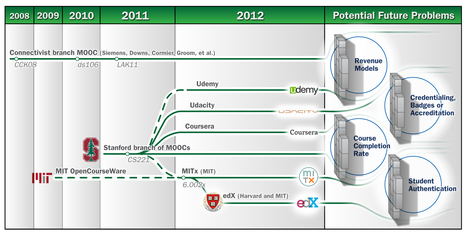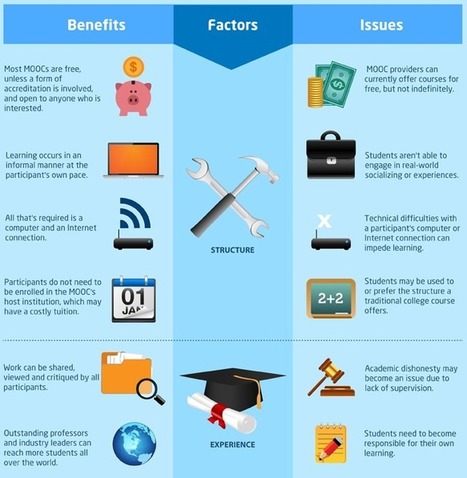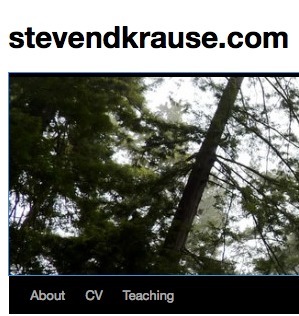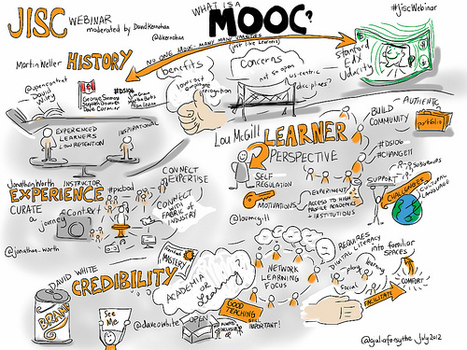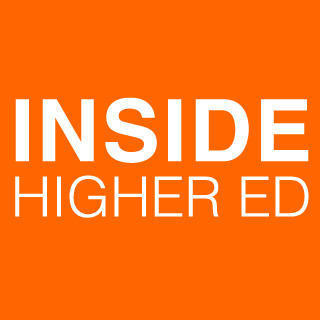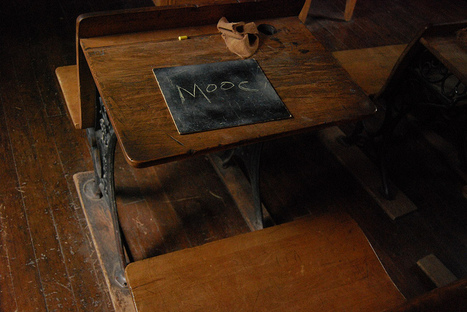Timothy Burke used the pop-culture reference to vent his frustration with the recent hype surrounding the MOOC. Burke’s not wrong. Pinning all hopes for the future of Higher Education on a single innovation – particularly one that is simply an iteration of distance learning going back several hundred years – is not a winning strategy. And he’s not alone. There seems to be a bit of a MOOC backlash going in the edu blogosphere.
Get Started for FREE
Sign up with Facebook Sign up with X
I don't have a Facebook or a X account

 Your new post is loading... Your new post is loading...
 Your new post is loading... Your new post is loading...
What are the implications of MOOCs on Higher Education and University teaching? In this article on single-most-important-experiment-in-higher-education:
As Koller and Ng acknowledged in our interview, Coursera is still in some ways a work in progress. Its grading technology, they said, is capable of assessing sophisticated assignments in science and math, but the company is still working out the best way to handle longer written work for humanities and social science programs. And as with many Silicon Valley darlings, how it will generate revenue is also a bit of an open question. Ng suggested that some schools may sell branded certificates, or that Coursera could begin offering career placement services, matching employers with students who demonstrate specific skills.
Herewith is my fantasy of an instructor’s letter of recommendation for a student in a MOOC.
To Whom It May Concern:.....
"I just finished a brief radio appearance (CBC) on the subject of Massive Open, Online Courses (MOOCs). The main guest was George Siemens who, with Stephen Downes, helped pioneer these courses in Canada. Even though all of the press coverage has gone to the competing Stanford edu-preneurs behind Coursera and Udacity, Siemens and Downes have done much of the most important work, theoretical and practical, distinguishing between good and bad MOOC’s." Via EDTECH@UTRGV
So I just finished a brief radio appearance (CBC) on the subject of Massive Open, Online Courses (MOOCs). The main guest was George Siemens who, with Stephen Downes, helped pioneer these courses in Canada.
On massiveness, students, and flipped classrooms - The annual Computing Research Association conference is taking place this week at Snowbird in Utah, and one of today's plenaries is about online eduction and Massive Online Open Courses (MOOCs).
Given the hype of national media coverage of massive open online courses (MOOCs), it is refreshing to see more recent analysis looking at important attributes such as revenue models, dropout rates, and instructional design. Steve Kolowich at Inside Higher Ed wrote a revealing and important article looking at early demographic data. Jeff Young at the Chronicle wrote an excellent article about Coursera’s contract with the University of Michigan, along with key insights into Coursera’s and the university’s motivations. Audrey Watters, in response to an article in the Atlantic, asks the tough question of whether we should care about the high dropout rates of current courses offered in this new model.
MOOCs are very popular at the moment (Massive Online Open Course) – talking about them rather than taking them. Maybe this is because there isn’t a huge amount of MOOCs available on a variety of different topics, but this is changing.
Here’s a good infographic on the ‘World of MOOCs’ – I’ve highlighted the section on the benefits and issues of MOOCs, as this is obviously going to be one of the first thing an educator will look at as to whether they (a) participate in a MOOC, or (b) help or facilitate in a MOOC.
OK, after all the fuss and blog posts written about MOOCs and how they’ll take over HE I’ve decided to take one, and the eLearning and Digital Cultures MOOCprovided by University of Edinburgh and Coursera looks a good start (it’s also a January ’13 start date so I’ve time to prepare!).
PS. only three of the teamare on Twitter, and I cannot see a hashtag for it yet.
The precise contours of the massive online open courses experience and its implications for higher education remain a mystery to everyone, including the investors, institutions and instructors.
Is it possible to gain the education and the intellectual development associated with a traditional bricks-and-mortar university curriculum through a largely online course of study?
Kim argues that no matter how well designed a MOOC is, the experience "with 160,000 fellow learners (as in Stanford's AI course) will never be comparable to a well-designed traditional online, blended or face-to-face course."
"They are as much substitutes for traditional courses (online, blended, or face-to-face), as Facebook is for real friends," he adds.
And once again, here I am near the lake, checking in on my online class (which I like to think of as SO-POC– that is, a “small online partly open class” because anyone out there is welcome to visit, join the discussion, do the assignments, whatever, but I won’t grade your work or give you credit if you aren’t enrolled at EMU), and checking my email when I see this from The Chronicle of Higher Education, “Inside the Coursera Contract: How an Upstart Company Might Profit From Free Courses.” |
I’m not the only professor cynical about the mad rush to massive open on-line courses. In A Sociological Eye on Education | Midsummer whimsy: How to write recommendations for 847 students....
I have much the same reaction: where is the revenue to support MOOCs supposed to come from? Huge numbers of people sign up for them when the courses are free, but charge even token fees as the number will drop enormously—probably to closer to the number who currently finish such courses. I signed up for Google’s course on searching, but when the time came for the course, I was too busy to do it. Had they asked for $1 for the course, I would not have signed up, knowing that there was a very high probability that I wouldn’t be able to attend.
As a life-long learner, I have appreciated engaging and interacting with a wide variety of educators in a few Massively ...
In a recent CBC radio interview and blog post, George Siemens discusses more about the good and bad aspects of Massively Open Online Courses are for online learning. There are different sides of the camp on this topic. Some believe MOOCs will either kill or transform the academy as we know it.
"The value of MOOCs may not be the MOOCs themselves, but rather the plethora of new innovations and added services that are developed when MOOCs are treated as a platform"
KF: George Siemens considers current thinking around MOOCs - trying to reclaim the pedagogicla positions that inform them, and predict some concerns that will need to be addressed in the near future.
From
uvenus
Bonnie Stewart, writing from Charlottetown, Prince Edward Island, Canada.
When I pitched this series of “Postcards from the Participatory” back in November of 2011, I’d intended it to be a small collection of narratives exploring Massive Open Online Courses from the inside.
I was engaged in the almost year-long #change11 MOOC, and I wanted to explore how the experience intersected with – and departed from – my teaching and learning within university walls. I thought the series might share a few stories about the resonances and challenges of participatory education, and explore the implications of distributed learning networks for conventional higher education.
ONLINE open courseware and the connected rising interest in e-portfolios for student assessment will be as much of challenge for standards as it is now for the educators looking to adapt their curricula.
ONLINE open courseware and the connected rising interest in e-portfolios for student assessment will be as much of challenge for standards as it is now for the educators looking to adapt their curricula. Griffith University vice-chancellor Ian O'Connor said changes sweeping university teaching would create new challenges for those attempting to monitor academic standards.
But it will inevitably lead to a greater focus on the assessment of student outcomes and graduate capabilities.
The growth of massive open online courses, backed by the likes of Stanford, Harvard and MIT, are impossible to ignore and universities are increasingly taking advantage of such content. Deakin University has said it will embed some of these MOOCs into its own curriculum. Others, such as University of Technology, Sydney, are looking to follow suit. At the same time, online technology is making it easier for universities to develop and share high-quality content.
Massive open online courses, or MOOCs, are popular. This much we know.
But as investors and higher ed prognosticators squint into their crystal balls for hints of what this popularity could portend for the rest of higher education, two crucial questions remains largely unanswered: Who are these students, and what do they want?
Some early inquiries into this by two major MOOC providers offer a few hints.
By accident, a microphone was left switched on at a medium sized state university’s Board of Governors meeting last week. In the best tradition of WikiLeaks, I am pleased to share a transcript with you.
Madam Chair. ‘Next item. Mr. Gedrich asked for this item to be included on the agenda. As a result, I have asked President Grimface to provide a briefing to the Board on MOOCHes’
President Grimface: ‘MOOCs, madam chair.’
Madam Chair: Ah, yes. Over to you, President Grimface.’
Massively open online courses, or MOOCs, do not currently lead to any widely recognized credential. Still, with more than 1.5 million people having registered for MOOCs through Coursera, Udacity and edX, the demand for the novel online offerings is undeniable.
But while demand appears to be high, none of these three organizations -- two of which are for-profit companies that will be expected to generate money for investors and the other of which is a nonprofit that will be expected to stand on its own feet eventually -- currently has a business plan.
I’m starting to get more than a little grumpy about MOOCs, what with all the hype about the revolutionary disruptions and game-changing tsunamis. I’m tired of the mainstream media punditry and their predictions that Stanford University’s experiments with online education (and by extension now Coursera and Udacity) will change everything; I’m tired of Silicon Valley’s exuberance that this could mark the end-of-the-(academic)-world-as-we-know-it – a future that its press, its investors, and its entrepreneurs are all invested (sometimes literally) in being both high tech and highly lucrative.
Hybrid Pedagogy is an academic and networked journal of teaching and technology that combines the strands of critical and digital pedagogy to arrive at the best social and civil uses of technology and digital media in education.
We are a social entrepreneurship company that partners with the top universities in the world to offer courses online for anyone to take, for free.
PM - Check them out, see what all the noise is about. |











